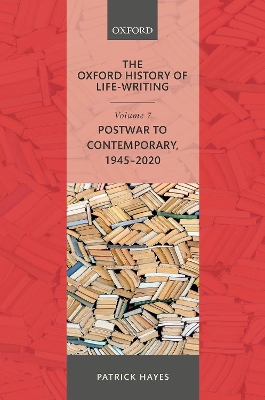Oxford History of Life-Writing
1 total work
With the growing urgency of questions about how to claim identity and achieve authenticity, life-writing started to acquire an unprecedented cultural importance. A range of social and economic developments, from the publishing boom in memoir writing to the rise of the internet, transformed the possibilities for self-expression. By the end of the timespan covered in this book life-writing was no longer something done mainly by important individuals who wrote their
autobiography, or by sensitive souls who kept a diary. It became a truly ubiquitous phenomenon, part and parcel of the everyday formation of selfhood.
Considering a diverse range of texts from across the English-speaking world, this volume places life-writing in relation to wider debates about the sociology and philosophy of modern identity, and the changing marketplace of publishing and bookselling. Yet in doing so it seeks above all to credit the extraordinary literary inventiveness which the pursuit of self-knowledge inspired in this period. Major subjects addressed include: the aftermath of World War II, including responses to the
Holocaust; the impact of psychoanalysis on biography; autofiction, autrebiography, and changing ideas about authentic self-knowledge; coming out memoirs and the transformation of sexual identity; feminist exemplary writing and lyric poetry; multilingualism and intercultural life-writing; the memoir boom and
the decline of intimacy; testimony narrative and memory culture; posthumanism in theory and practice; literary biography as an alternative to literary theory; literary celebrity and its consequences for literature; social media and digital life-writing.
autobiography, or by sensitive souls who kept a diary. It became a truly ubiquitous phenomenon, part and parcel of the everyday formation of selfhood.
Considering a diverse range of texts from across the English-speaking world, this volume places life-writing in relation to wider debates about the sociology and philosophy of modern identity, and the changing marketplace of publishing and bookselling. Yet in doing so it seeks above all to credit the extraordinary literary inventiveness which the pursuit of self-knowledge inspired in this period. Major subjects addressed include: the aftermath of World War II, including responses to the
Holocaust; the impact of psychoanalysis on biography; autofiction, autrebiography, and changing ideas about authentic self-knowledge; coming out memoirs and the transformation of sexual identity; feminist exemplary writing and lyric poetry; multilingualism and intercultural life-writing; the memoir boom and
the decline of intimacy; testimony narrative and memory culture; posthumanism in theory and practice; literary biography as an alternative to literary theory; literary celebrity and its consequences for literature; social media and digital life-writing.
